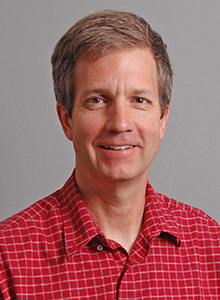Sandia computational scientist Steve Plimpton receives IEEE Computer Society’s Sidney Fernbach Award

Steve Plimpton, a computational scientist at Sandia’s Center for Computing Research, has been named recipient of the IEEE Computer Society’s 2017 Sidney Fernbach Award for “high-performance computer simulation frameworks that have advanced research in materials science, chemistry, biology, and other related areas.”
The citation, while accurate in scope, hardly portrays the depth of Steve’s contributions.
Bill Camp, retired Sandia computational director and winner of the IEEE’s 2016 Seymour Cray computer engineering award, has written, “One cannot overstate the pioneering aspects of [Steve’s] work. He developed highly successful scalable methods in so many areas of supercomputing applications that it is hard to remember them all. He is perhaps most widely known in the science community for his work on … molecular dynamics: His LAMMPS codes and Eco-system are so successful that it is hard to believe that there was just one person at the core of what has become a major community spanning several scientific disciplines, from materials science to chemical physics to molecular biology.”
“One cannot overstate the pioneering aspects of [Steve’s] work. He developed highly successful scalable methods in so many areas of supercomputing applications that it is hard to remember them all."
Wrote Steve’s manager Veena Tikare, “Steve designs computational methods and frameworks for massively parallel computing platforms … that allows other computational scientists to easily implement their own models …. Frameworks Steve has designed have enabled advances in modeling and simulation by entire communities of computational scientists in biology, chemistry, materials and chemical engineering, physics, and related disciplines.”
Open-source codes Steve played a major role in developing include SPPARKS (modeling of materials processing at the mesoscale), and SPARTA (modeling of turbulence and flow in low-density gases). The most widely used is LAMMPS, a molecular dynamics code that has a world-wide community of thousands of users and hundreds of code contributors.
Wrote former Sandia computational director Bruce Hendrickson, “Steve … is selfless to a fault, always giving credit to others. Because of his broad and deep technical impact, his leadership and his service, I can think of no more deserving candidate for the Fernbach Award.”
Says Steve, “It’s an honor to be recognized for what has been the most satisfying part of my career at Sandia: helping create software tools — applications and libraries — that other people find useful for modeling science and engineering problems. That work has been a collaborative effort with many great scientists and software developers, many of whom are at Sandia. So I want to share credit for this award with all those folks who have been so enjoyable to work with over the years, many of whom have become good friends.
“I also want to say thanks to the past and present management of our center, where I’ve spent my whole career, almost 30 years. They’ve had the vision to make high performance computing an integral part of what Sandia does, and create an environment where someone like me, who straddles physical sciences/computer science/math while being expert in none of them(!), can fit in and make an impact.”
Steve was formally recognized at the SC17 Conference Awards Plenary session in Denver on Nov. 14 and presented a special invited talk at a technical session on Nov. 15.
A Fellow of the American Physical Society, Steve has also been honored with a special session at the Minerals, Metals & Materials Society annual meeting for the development of LAMMPS. He received his PhD in applied and engineering physics from Cornell University in 1989.
The Fernbach award, established in 1992 in memory of HPC pioneer Sidney Fernbach, recognizes innovative approaches that produce outstanding HPC results. It is one of the highest awards of the IEEE, which has more than 423,000 members in 160 countries and according to its website “is the world’s largest technical professional organization dedicated to advancing technology for the benefit of humanity.”